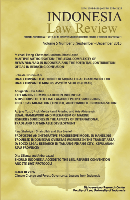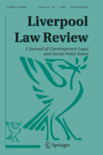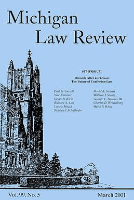
UCLA LAW REVIEW
Scope & Guideline
Shaping the future of law through critical discourse.
Introduction
Aims and Scopes
- Social Justice and Equity:
The journal consistently focuses on themes of social justice, particularly as they relate to marginalized communities, including discussions on race, gender, and disability rights. - Critical Legal Studies:
A strong emphasis on critical theory informs many articles, exploring how law interacts with societal norms and power dynamics, often critiquing existing legal frameworks. - Interdisciplinary Approaches:
The UCLA Law Review incorporates interdisciplinary perspectives, drawing from fields such as sociology, political science, and cultural studies to enrich legal discourse. - Legal Reform and Advocacy:
The journal advocates for legal reforms aimed at dismantling systemic injustices, with a focus on abolitionist frameworks, police reform, and restorative justice. - Emerging Legal Technologies and Ethics:
Recent publications have begun to explore the implications of technology in law, particularly regarding algorithmic bias and privacy issues, reflecting a growing concern for ethical considerations in legal practice.
Trending and Emerging
- Abolitionist Frameworks:
A significant trend is the exploration of abolitionist perspectives, particularly in relation to policing and incarceration, advocating for transformative justice and community-led alternatives. - Intersectionality in Law:
Recent publications highlight the importance of intersectionality, examining how overlapping identities—such as race, gender, and disability—impact legal outcomes and the lived experiences of individuals. - Environmental Justice and Law:
There is an increasing focus on the intersection of environmental issues with legal frameworks, particularly regarding how marginalized communities are disproportionately affected by environmental policies. - Digital Privacy and Algorithmic Accountability:
Emerging concerns about digital privacy and the implications of algorithmic decision-making in law are gaining traction, addressing the need for accountability in increasingly automated legal processes. - Indigenous Rights and Sovereignty:
The journal is also focusing on themes surrounding Indigenous rights, sovereignty, and decolonization, reflecting a growing acknowledgment of the historical injustices faced by Indigenous populations.
Declining or Waning
- Traditional Legal Doctrines:
There is a noticeable reduction in articles focusing solely on traditional legal doctrines without a critical or social justice lens, indicating a move towards more progressive and reform-oriented discussions. - Conventional Law and Order Perspectives:
Themes centered around conventional law enforcement practices and punitive measures are appearing less frequently, as the journal increasingly prioritizes abolitionist perspectives and critiques of the carceral state. - Narrowly Focused Jurisprudence:
The decline in discussions solely focused on narrowly defined legal issues suggests a shift towards broader, more systemic analyses of law's role in society, as well as its intersections with social justice movements.
Similar Journals

Tsinghua China Law Review
Innovating legal discourse for a connected world.Tsinghua China Law Review is an esteemed academic journal published by the Tsinghua University School of Law in China, dedicated to advancing the field of law through rigorous scholarly analysis and critical discourse. Established in 2019, this journal has carved a niche for itself within the legal community, striving to cover pertinent issues in Chinese law and its intersections with global legal trends. Although it retains an H-index disclaim and has discontinued its coverage in Scopus after 2024, it continues to provide a platform for innovative research and thought-provoking essays. Recognized for its contributions, it is categorized as Q4 in Law based on the latest ranking, positioning it at a pivotal juncture for emerging scholars aiming to make their mark within the legal scholarship landscape. With open access options limited, Tsinghua China Law Review remains a valuable resource for researchers, professionals, and students eager to engage with contemporary legal issues that shape society in an increasingly interconnected world.

Indonesia Law Review
Exploring the Complexities of Indonesian LawIndonesia Law Review is a premier open-access academic journal dedicated to advancing knowledge in the fields of law and social sciences, with particular emphasis on the Indonesian legal landscape. Established by the Indonesian Law Review, this journal has made significant strides since becoming open access in 2014, ensuring that research is freely available to a global audience. Based in Depok, West Java, the journal seeks to foster scholarly discourse on legal issues pertinent to Indonesia, while also contributing to the broader field of education and social sciences. With its current Scopus rankings placing it within the top tiers of law and social sciences, including a Q3 categorization in law and a Q4 classification in education and miscellaneous social sciences, the **Indonesia Law Review** serves as a vital platform for researchers, professionals, and students to disseminate their findings and engage with contemporary legal dilemmas. The journal is committed to providing a robust forum for innovative legal scholarship and is an essential resource for anyone seeking to understand the complexities of law in Indonesia and beyond.

Alternative Law Journal
Unpacking Complexities at the Intersection of Law and Sociology.Alternative Law Journal, published by SAGE Publications Ltd, stands as a pivotal platform for critical discourse within the fields of law, sociology, and political science. Since its inception in 2008, the journal has fostered innovative scholarship aimed at exploring the intersections of legal practices and social justice, making it an essential resource for researchers, practitioners, and students alike. With its current ranking at Q3 in both the Law and Sociology categories according to the latest Scopus metrics, the Alternative Law Journal ensures a robust academic discourse, promoting diverse perspectives and challenging conventional norms. The journal's address reflects its international reach, further underscoring its commitment to fostering a global dialogue on pressing legal and societal issues. This journal is crucial for anyone seeking to stay updated with contemporary thoughts and research impacting law and society.

Adelaide Law Review
Advancing legal scholarship in the heart of Australia.The Adelaide Law Review, published by the University of Adelaide, stands as a notable journal in the field of law, offering valuable insights into a wide range of legal topics relevant to practitioners, scholars, and students alike. With an ISSN of 0065-1915 and a history of publication that has evolved from 2019 to 2023, it serves as a platform for the dissemination of rigorous legal scholarship. Although currently categorized in Quartile 4 within the law category, the journal remains instrumental in contributing to legal discourse, particularly in the Australian context. With a Scopus ranking of #733 out of 1025 and a 28th percentile ranking in Social Sciences Law, the Adelaide Law Review is committed to advancing the understanding of vital legal issues through thoughtful articles, case analyses, and critical commentaries. This journal provides an essential resource for legal professionals and academic researchers seeking to engage with contemporary legal challenges. While it does not offer open access at this time, its scholarly contributions ensure it remains a respected publication within the legal community.

Liverpool Law Review
Championing Open Access to High-Quality Legal ResearchLiverpool Law Review, published by Springer, is a prestigious open-access journal in the field of law, dedicated to fostering scholarship and promoting dialogue on contemporary legal issues. Since its inception, the journal has evolved significantly, with a publishing history dating back to 1979 and showcasing an extensive range of articles and reviews that contribute to the development of legal theory and practice. The journal is indexed under Scopus, ranking #352 out of 1025 in the Social Sciences category, placing it in the 65th percentile—indicative of its solid reputation and relevance in the field. Liverpool Law Review provides an engaging platform for researchers, professionals, and students alike by facilitating access to high-quality legal research, with full open access available since 2012, ensuring that vital academic discussions are accessible to a global audience. With its commitment to exploring both historical and contemporary issues in law, this journal remains an essential resource for those seeking to deepen their understanding and contribute meaningfully to the legal landscape.

COLUMBIA LAW REVIEW
Empowering Legal Discourse through Rigorous ScholarshipCOLUMBIA LAW REVIEW, published by the COLUMBIA JOURNAL TRANSNATIONAL LAW ASSOCIATION, is one of the foremost legal journals in the United States, committed to advancing the discourse on critical legal issues. With an ISSN of 0010-1958 and an E-ISSN of 1945-2268, this prestigious publication has established a strong reputation, reflected in its Q1 rank in Law and a Scopus ranking of #145 out of 1025 journals in the social sciences category, placing it in the 85th percentile. COLUMBIA LAW REVIEW serves as a vital platform for legal scholars, practitioners, and students, publishing notable articles, case studies, and commentaries that influence both academic and practical perspectives on law. With a publication history spanning multiple decades, from its converged years of 1973 to 2024, it remains a key resource for those looking to stay updated on contemporary legal thought and developments. While it operates under a traditional subscription model, the journal’s rigorous peer-review process ensures the highest quality of scholarship in the legal field, solidifying its importance for both emerging and established legal professionals.

ALBERTA LAW REVIEW
Advancing legal scholarship since 1974.ALBERTA LAW REVIEW, published by the University of Alberta, stands as a key academic journal in the field of law, contributing to the discourse on legal issues and developments in Canada and beyond. With an ISSN of 0002-4821 and an E-ISSN of 1925-8356, this journal has been pivotal since its inception in 1974, providing a platform for legal scholarship that spans a diverse range of topics, from constitutional law to social justice. Although it operates under a traditional subscription model, the journal's illustrious history and rigorously peer-reviewed content affirm its stature in advancing legal research and education. The Alberta Law Review not only serves as a resource for academics and students, but also offers legal practitioners critical insights and analysis pertinent to contemporary legal challenges. With a commitment to enlightening the discourse around law, it is an invaluable asset for anyone engaged in the legal profession or related fields.

FORDHAM LAW REVIEW
Elevating Legal Discourse for Tomorrow's ChallengesFORDHAM LAW REVIEW is a prestigious legal journal published by Fordham University, School of Law, based in the United States. Established to disseminate cutting-edge legal scholarship, this journal has consistently achieved an impactful standing within the field, evidenced by its category ranking as Q1 in Law for 2023 and its Scopus ranking of #428 out of 1025 in the Social Sciences Law category, placing it in the 58th percentile. The journal welcomes submissions across diverse legal topics, fostering discourse that advances both legal theory and practice. Although it does not currently offer open access options, the Fordham Law Review serves as a vital resource for scholars, practitioners, and students seeking insights into contemporary legal challenges and developments. With its rich publication history dating back to the converged years of 1973 through 2024, the journal continues to be a cornerstone for rigorous legal analysis and a platform for influencing the evolution of law.

Denver Law Review
Shaping the future of law with impactful scholarship.Welcome to the Denver Law Review, a distinguished journal published by the University of Denver, Sturm College of Law that serves as a pivotal platform for the exploration and discussion of contemporary legal issues. With its ISSN of 2469-6463, the journal has established itself within the legal scholarship community, holding a notable Q2 rank within the field of Law according to the 2023 category quartiles. The Denver Law Review is committed to advancing legal research and scholarship, providing open access to critical insights and analyses essential for practitioners, scholars, and students alike. With an impact factor bolstered by its Scopus ranking at 620/1025, the journal facilitates rich scholarly conversations and promotes the understanding of the law in today's dynamic context. We invite you to explore the innovative articles and research that contribute to the evolving landscape of jurisprudence.

MICHIGAN LAW REVIEW
Exploring the Intersection of Law and SocietyMICHIGAN LAW REVIEW, published by the Michigan Law Review Association, stands as a prestigious journal in the field of law, offering an influential platform for critical legal scholarship and discussion. With an ISSN of 0026-2234 and an E-ISSN of 1939-8557, this journal features a longstanding commitment to analyzing contemporary legal issues and contributing to academic dialogue. Situated in the United States, the journal reflects a rich historical legacy, with converged publication years stretching from 1974 to present, thereby preserving its position as a key resource for legal researchers and practitioners. Ranked in the Q1 category within its field for 2023, and holding a notable Scopus rank of 276 out of 1025 in the Social Sciences _ Law category, it plays a critical role in shaping legal thought and policy. Although not open access, its detailed articles and comprehensive reviews are instrumental for law students, academics, and legal professionals who seek to stay at the forefront of legal scholarship.